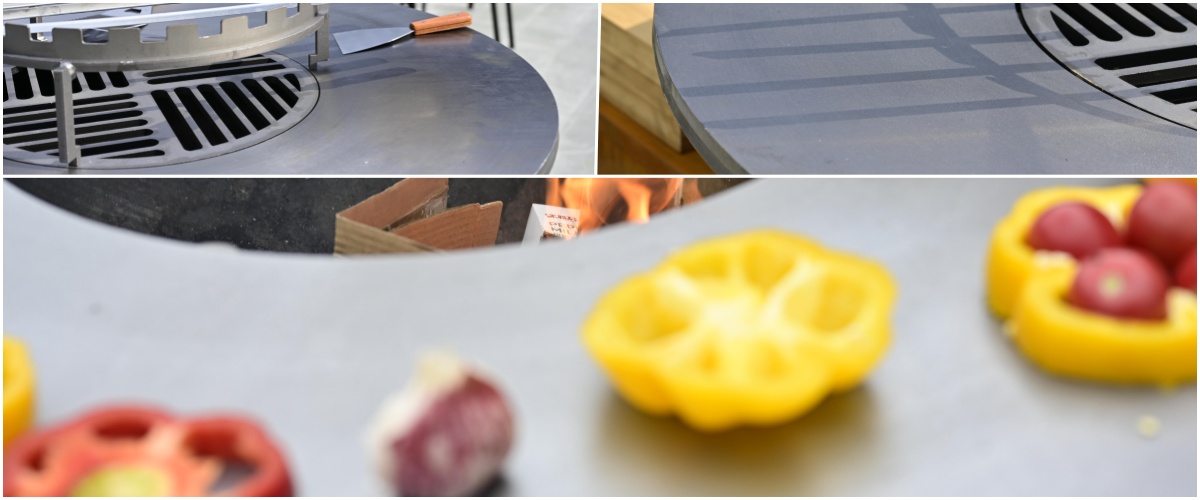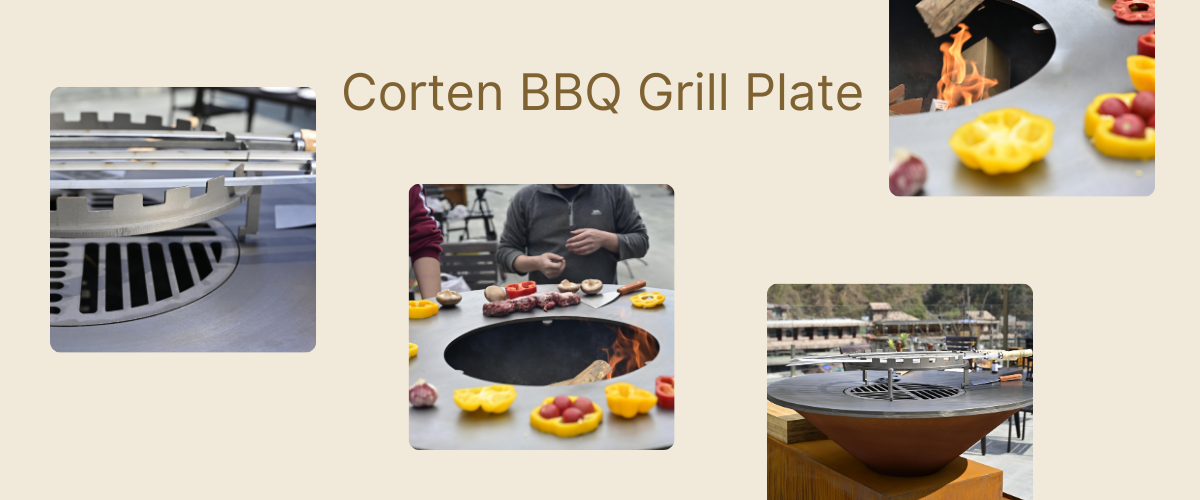At the barbecue, the grill pan material decides how well the food will turn out on the grill. It is important to know the best grill pan materials for optimum results, regardless of whether you are a well-seasoned grill enthusiast or a fabricator looking for the ideal material for your next production line. In this article, we'll take a look at the best grill plate materials, what they're good for, and how they impact the performance of your grill. Covering everything from durable and insulating properties to cleaning ease, we'll give you all the information you need to choose the appropriate grill plate material for your application.
Why is Grill Plate Material Important?
Barbecue plate materials have an important role to play in the grilling process. Materials affect heat distribution, how easy it is to cook, and how easy it is to clean. Selecting the wrong material can cause uneven cooking, sticking of food to the grill plate, and an improvement in the overall quality of the grilled food. Conversely, choosing the best material for your grill pan makes your grilling enjoyable, efficient, and delicious.
Top Materials for BBQ Plates
1. Corten Steel Grill Plates: Unparalleled Durability and Stylishness
Corten steel is ideal for grill plates because of its superior durability, resistance to corrosion, and unique aesthetics. Corten steel is commonly used in construction and outside areas and is favored by grilling enthusiasts and manufacturers for its ability to withstand extreme temperatures and outdoor environments.
Benefits of Corten Steel Grills:
• Resistance to Weathering: Corten steel develops a protective layer of oxidation that protects it from rust and corrosion. As a result, it is ideal for outdoor cooking, where exposure to the natural elements is unavoidable.
• Durability: Corten steel is highly durable and will last for several decades with regular use. It is a wear-resistant material, which means you won't have to replace your baking sheets as often.
• Thermal Retention: Corten steel has outstanding thermal properties that distribute heat uniformly. Together, this guarantees even cooking and consistency every time you grill.
• Aesthetics: Corten steel's exceptional appearance creates a modern and elegant look on the grill, perfect for those who emphasize functionality and design.

2. Stainless Steel Grills: Classic and Secure
Stainless steel is the other popular material for grills owing to its robustness, anti-rust properties, and low-maintenance nature. Stainless steel grill pans remain a staple in the grilling world for many years and for all the good reasons in the world.
Benefits of Stainless Steel Grill Pan:
• Non-reactive: Stainless steel, unlike other materials, is not reactive with food, so the taste of grilled food will not be affected.
• Easy to Clean: Stainless steel is impervious to stains and food debris because it is non-porous, which makes it one of the simplest materials to clean after cooking.
• Corrosion Resistant: Stainless steel is resistant to rust and corrosion and is good for any weather conditions. It is particularly suitable for damp and coastline areas.
• Even Distribution of Heat: Stainless steel conveys heat uniformly, assuring consistently high cooking performance.
3. Cast Iron Pans: Robust and Traditional
Cast iron is a mainstay of the iron skillet, renowned for its excellent heat retention and cooking capabilities. Plenty of chefs and barbecue enthusiasts alike trust cast iron to make sure meats are seared to perfection.
Advantages of Cast Iron Grill Pans:
• Retention: Cast iron retains heat very well. It is vital for high-temperature grilling or cooking.
• Enhances Flavor: Seasoning on cast iron flakes lends flavor to grilled food and helps improve the flavor of the food with time.
• Durable: Cast iron plates are weighty and can easily rust if not taken care of. But, with proper upkeep, a cast iron plate can be used for the rest of your life.
• Versatile: Cast iron grills dissipate electricity evenly, which is perfect for cooking a variety of meals ranging from grilled steaks to vegetables.
4. Ceramic Grill Plates: Cook evenly, clean up easily
Ceramic grill plates are increasingly popular for their even heat distribution and non-stick characteristics. Ceramic grill pans are favored for cooking exquisite foods such as fish, vegetables, and even pizza.
Benefits of Ceramic Grill Plates:
• Non-stick Surface: Ceramic plates are inherently non-stick so that delicate foods don't break apart or stick to the plates when cooking.
• Even Heat Distribution: Ceramic material helps to cook food thoroughly and consistently by making sure that heat is distributed evenly across the grill plate.
• Easy to Clean: Ceramic grill plates are typically easy to clean since they do not necessitate a significant amount of post-grilling scrubbing or maintenance.
5. Aluminum Grill Plates: Lightweight and Easy to Transport
Aluminum grill plates have a reputation for being lightweight and highly portable, which makes them perfect for anyone who likes to grill out.
Advantages of Aluminum Grill Plates:
• Lightweight: Aluminum grill plates are much lighter than cast iron or metal grill plates, allowing for easier transportation and storage.
• Corrosion Resistant: Aluminum plates are highly resistant to corrosion and rust, great for prolonged outdoor usage.
• Affordable: Aluminum plates are normally less costly than other materials, which makes them an economical option for barbecue lovers.
How to Customize a Grill Plate for Your Barbecue Style?
Consider the Cooking Method
Various grill plates are appropriate for different cooking methods. For those who prefer slow cooking or smoking, ingredients such as cast iron and stainless steel are ideal as they retain heat. On the other hand, if you prefer high-temperature barbecuing or baking, materials such as Corten steel and aluminum will supply the necessary heat for what these cooking methods involve.
Durability
Durability should be a top concern if you intend to utilize your iron on a regular schedule. Corten steel and cast iron barbecue grills stand out for their durability and are great investments for barbecue enthusiasts.
Match the Aesthetic
Getting down to aesthetics, the material of the iron plate makes a significant contribution to the appearance of the grill. Corten steel grill plates create a rustic, industrial outlook, whereas stainless steel provides a sleek, modern look. Pick the material that best fits your outdoor space and individual style.

How to Maintain Grill Materials?
Proper care and maintenance are essential to extend the lifespan of your grill, no matter which material you use. Below are some tips for caring for the most commonly used grill pan materials.
• Carbon Steel: Enables the grill plate to rust and form a protective coating naturally. Wipe away food residue with a wet cloth after cooking and refrain from using harsh chemicals.
• Stainless Steel: Use warm soapy water and a soft cloth. Keep it shiny with a stainless steel cleaner.
• Cast Iron: Prevent rusting by periodically oiling cast iron cookware with vegetable oil. Use a stiff brush to clean, do not use soap.
• Ceramic: Remove with a soft cloth or sponge to avoid scratching the surface. Never use an abrasive brush.
Conclusion
Factors such as durability, heat retention, easier cleaning, and aesthetic preferences have to be considered when choosing the perfect material for your cooktop. Corten steel, stainless steel, and cast iron are some of the materials that offer unique grilling advantages, While ceramic and aluminum plates are lightweight, non-stick alternatives. No matter your grilling style, there's a grill plate material that will improve your outdoor grilling enjoyment.
For those looking for high-quality Corten steel grill plates and other premium materials, our factory specializes in producing durable and attractive grill plates for wholesalers and brand owners. Contact us to discover how we can help you with the perfect grill plate for your requirements.

